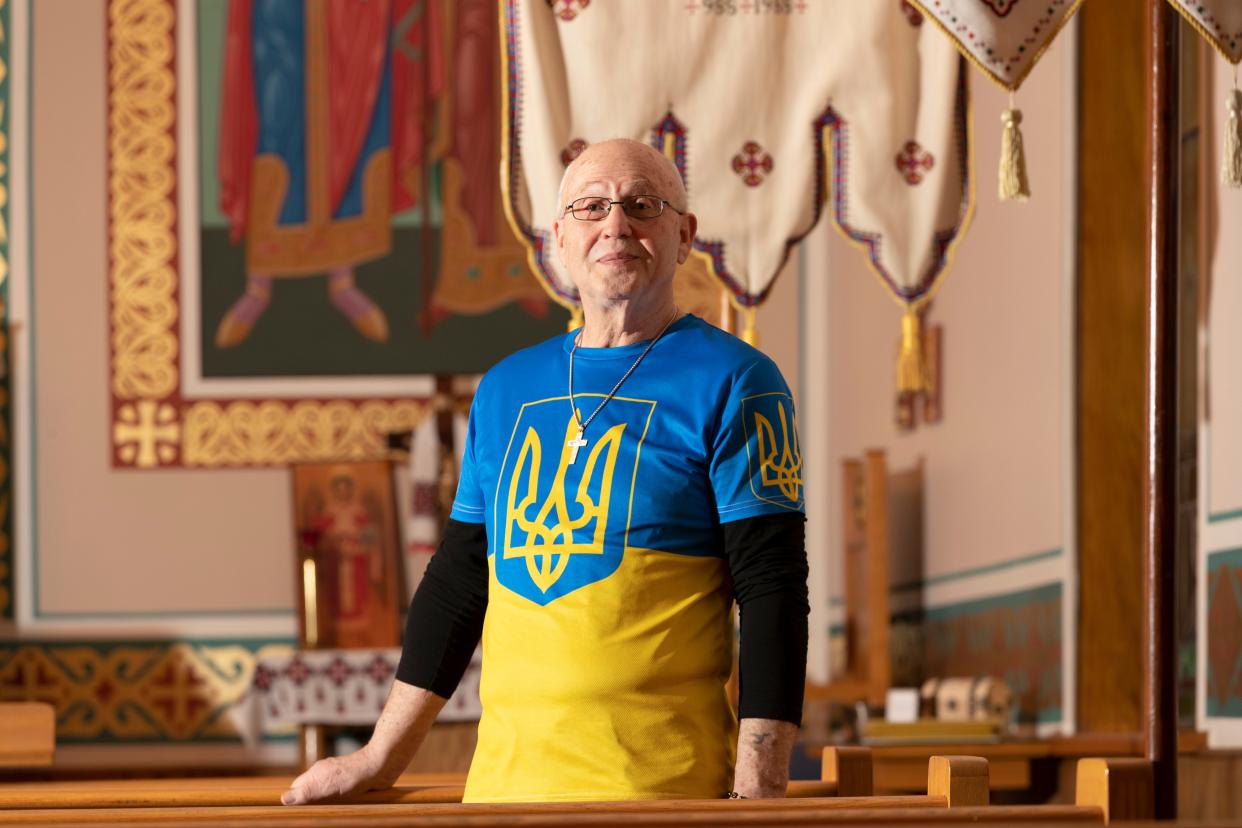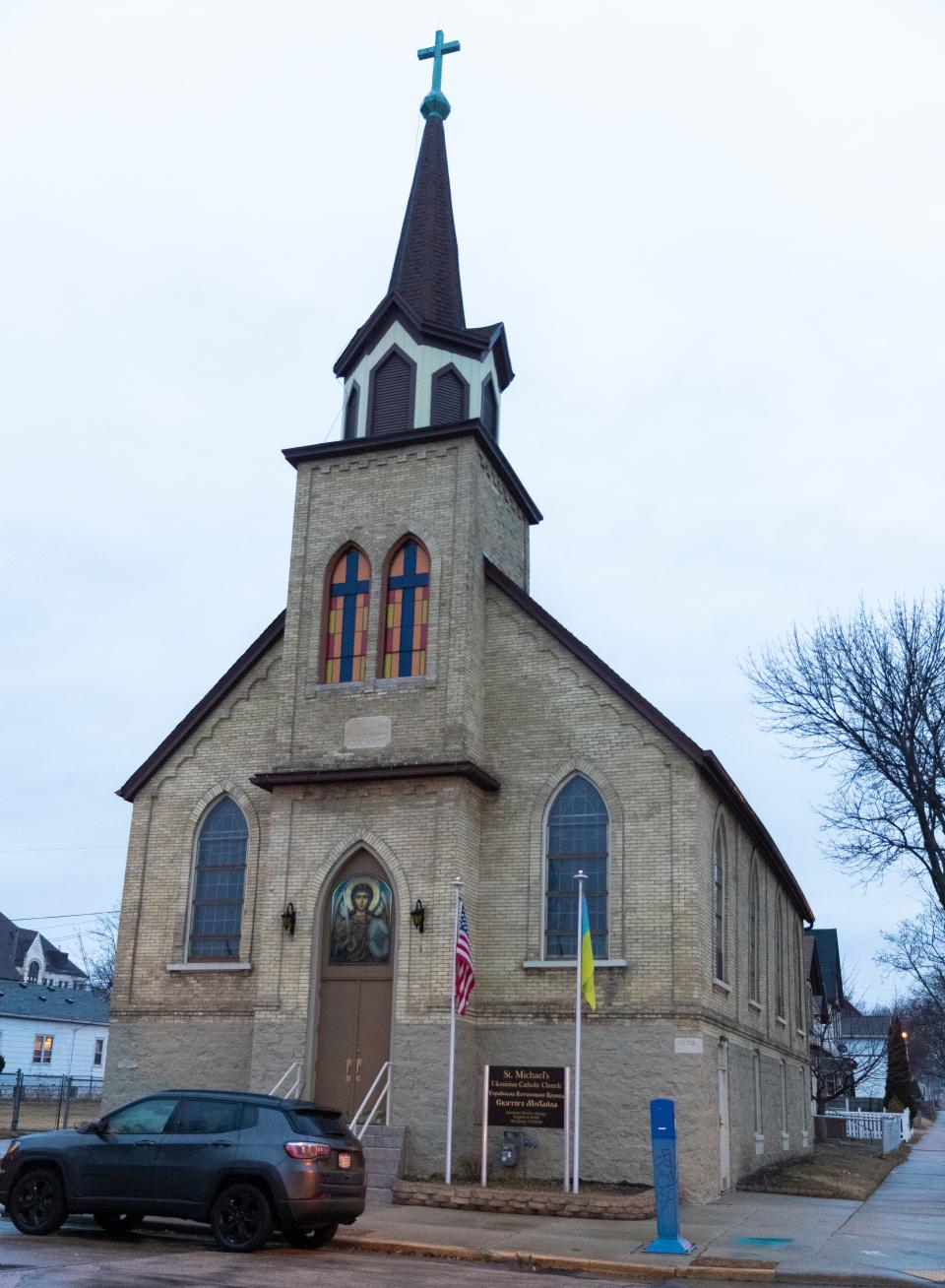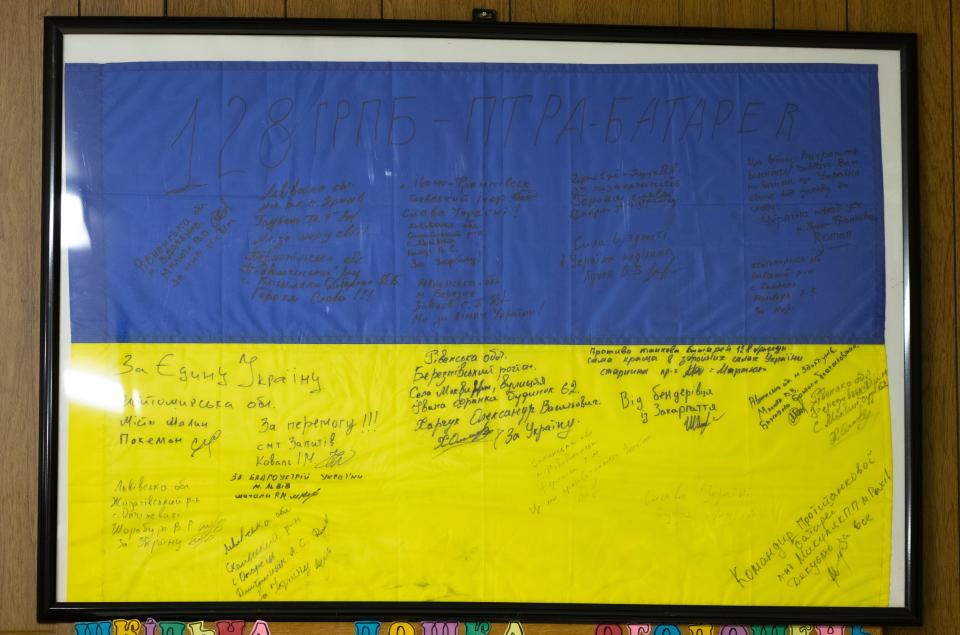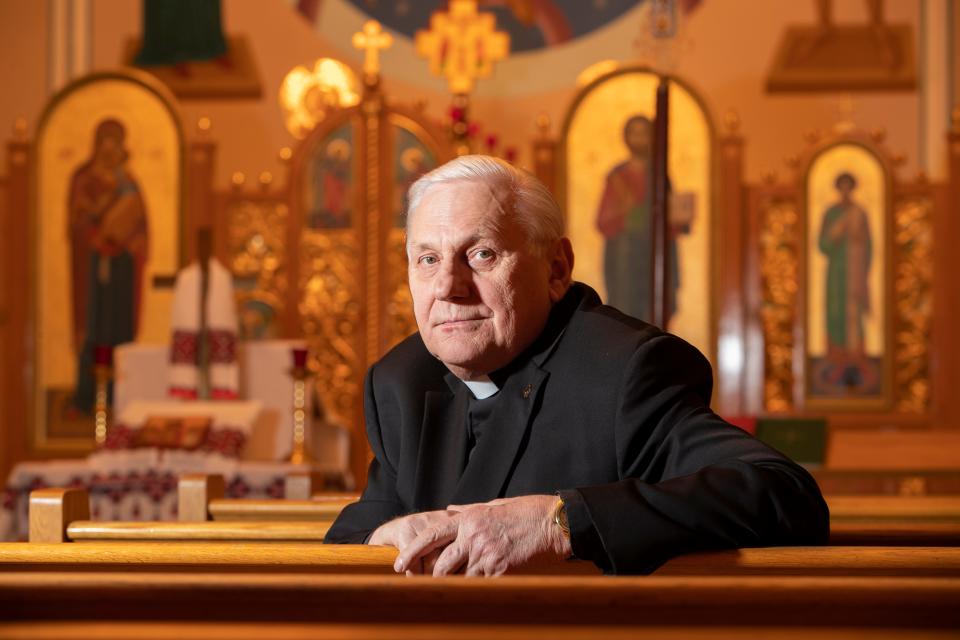Wisconsin's Ukrainian-American community worries for family, friends under threat from Russian attack

- Oops!Something went wrong.Please try again later.
MILWAUKEE – Incense floated through a crowd of about 20 people gathered Sunday at St. Michael's Ukrainian Catholic Church, a modest Victorian chapel in the Walker's Point neighborhood of Milwaukee.
Among the hymns sung by parishioners at the church was "Prayer for Ukraine," a song composed by Mykola Lysenko, Ukraine's most famous national composer.
The song is appropriate, as many church members are indeed praying for the fate of friends and relatives in Ukraine, as over recent months, Russia has gathered about 150,000 troops along Ukraine's borders, encircling the country and raising fears of an imminent attack.
It's what Nadiya Kavyuk, who came with her family to Wisconsin in 2007 from the western Ternopil region, tells her American friends to do. "They ask me, they text me," she says. "One called me and she said, 'Do you think we can do something for you?'"
Kavyuk told her friend that for now there was little she could do besides pray for them, reflecting a feeling of helplessness common among the members of the congregation.
RELATED: Russia-Ukraine explained: Inside the crisis as US, allies await next move
Joseph Spolowicz, the church's vice president, said the congregation is made up of about half U.S. born Ukrainian-Americans and half immigrants who were born in Ukraine.
They are members of the Ukrainian Greek Catholic Church, the second largest group of believers in Ukraine after members of Christian Orthodox churches, and they mostly come from or have roots in the western part of the country.
"There's a strong connection between the church and Ukraine," says Spolowicz, who was born in the U.S. but has cousins and family in western Ukraine and has made several trips there throughout his life. "We have several members who are in Ukraine right now, and people who go back and forth. So, strong ties."

Uncertainty builds as Russia-Ukraine tensions continue
Starting in October, Russia began amassing military personnel and equipment near its borders with Ukraine, reaching 100,000 troops by December.
In crisis diplomatic talks, Russian leader Vladimir Putin has demanded that the U.S. guarantee Ukraine will never enter NATO, the alliance of nations originally formed in 1949 by the United States, Canada and several western European nations to provide collective security against the Soviet Union. After the break-up of the Soviet Union in 1991, NATO was enlarged to include re-unified Germany and other former communist countries in eastern Europe, but not Ukraine.
The U.S. does not have the power to grant or block Ukraine's membership in the organization, which can only be gained through the unanimous consent of its member states.
However, some observers have accused Putin of using NATO demands as an excuse to re-invade Ukraine after its first incursions in 2014 — the year Russia occupied the Crimea region of Ukraine and backed separatists fighters in the eastern Donbass region, sparking a frozen conflict that continues to this day.
"Putin is a murderous thug," Spolowicz says bluntly. "I don't trust him for a minute on any of this. ... I think the U.S. cannot let somebody do that kind of stuff (taking over the entire country of Ukraine), because everybody, all the other countries are under threat if this is allowed to happen."
The U.S. has sent around 5,000 troops to neighboring Poland amid the ongoing tensions.
Andrew Levitsky has family in Lviv, a medieval city of a little more than 720,000 residents close to the border with Poland. He says the news of Russian troop build-up reminds him of family stories of violence that took place in Ukraine surrounding World War II.
Levitsky, like many U.S. military experts, thinks the fighting could escalate to bloody urban warfare of the kind seen during the U.S. invasion of Iraq in the early 2000s or the Syrian civil war in the 2010s if Russia were to invade deeper into Ukraine.
"In Europe, nobody has seen it for 80 years," he said of the type of warfare that he thinks would ensue.
He doesn't know what he will do for his parents and family members if such a widespread invasion of the country were to take place, as they don't have visas to come to the U.S.
He sighs often, thinking of the humanitarian disasters that could unfold as people try to escape fighting.
He tells a USA TODAY NETWORK-Wisconsin reporter that he is not very optimistic about the situation.

Anxiety grows for elderly family members in Ukraine
Over coffee and pastries after the church service, the parishioners of St. Michael's discuss their fears for the ones they love back home, many with health and mobility issues that make evacuation in the event of an attack a more difficult prospect.
Anya Nakonechna and her mother Oksana, sitting at a table across from one another, are concerned about Oksana’s elderly parents who live in Lviv.
“We’ve been thinking about methods to bring my grandparents over,” said Anya. “Definitely just analyzing every situation that could come by.”
Oksana says she would probably try to go there to get her mother, though that could be made more challenging by the many flights to Ukraine that have been cancelled by international airlines in recent weeks.
On Feb. 12, the U.S. State Department had ordered most of its American embassy employees in the capital city of Kyiv to evacuate the city.
“My mother, yesterday it seemed like she was getting scared, because they’re older people. My mom is 75, my dad is 84,” Oksana said.
Anya is a 21-year-old opera student at the Lviv National Music Academy. Because of the pandemic, she is at home with her family in Milwaukee and taking classes online.
Though she and her family members have become more worried in recent weeks, she said there had not been a sense of panic among people she knows in Ukraine. “People are used to it,” she says of the threat from Russia. “They live on with their daily lives.”
She says her professors tell their students not to worry and that classes are continuing as normal.
Spolowicz said that split in the level of worry is also something he has seen among church members.
"Some people are clearly worried and others kind of feel like things are going to get resolved," he said.

'Everyone is scared.'
Kavyuk says she looks for ways to support her home country from far away. She says that like most Ukrainians, she speaks the Russian language and understands it, but says her family does not watch Russian movies or Russian YouTube channels.
"The more you watch," Kavyuk says, "they have commercials and commercials mean money."
They have also stopped buying Russian products at stores selling regional foods and other items.
"We don't support them in this case. That's what we can do here," she says.
Kavyuk says anxiety among her family members is very high, especially since last week, when city officials came to her parents' apartment block to inspect the basement to see if it would be a sturdy enough place for people to hide in case of a bombing attack.
"They get ready for it, just in case," says Kavyuk.
Roman Kit, came to the U.S in the 1980s as a political refugee.
He has memories of repression by Russia stretching all the way back to the Soviet era, when he says his grandfather's land in his village was confiscated by Soviet officials during forced collectivization of Ukrainian farms.
He had his children baptized in the Ukrainian Catholic Church, which was then illegal in the Soviet Union, and a neighbor informed on his family to the KGB, which was then the country's state security agency.
Kit lost his job at a technical college and his wife lost her job as a chef in a restaurant. With no more prospects for work at home, they emigrated to the U.S.
Right now, he says of his family still in Ukraine, "Everyone is scared. Everyone has this security suitcase," referring to a go-bag packed with essential documents and personal items they may need if they are forced to evacuate from their homes.
On Tuesday, after earlier reports that Russia could begin an invasion as soon as Feb. 16, Russian officials announced they had begun to withdraw some troops from the border with Ukraine. But at a Tuesday press conference, President Joe Biden said U.S. intelligence had not verified these claims and that "they remain very much in a threatening position."
On Wednesday, NATO Secretary-General Jens Stoltenberg said that Russia's claims were grounds for cautious optimism, but noted that NATO had not seen any actual "de-escalation on the ground."
MORE: Plight of Afghan refugees set to settle in Wisconsin brings back memories for Wausau Hmong family
Renee Hickman is a Report For America corps member based at the Wausau Daily Herald covering rural issues in Wisconsin. Contact at rhickman@gannett.com or follow her on Twitter at @ReneeNHickman. Please consider supporting journalism that informs our democracy with a tax-deductible gift to this reporting effort at WausauDailyHerald.com/RFA.
This article originally appeared on Wausau Daily Herald: Russia attack: Ukrainian-Americans in Wisconsin worry for family, friends

